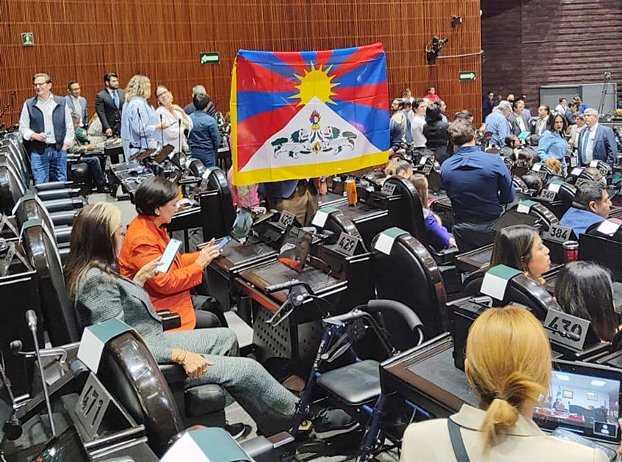
Shouting “Free Tibet” and “Free the Uyghurs” a group of Mexican legislators interrupted a congressional session last week at which China’s new ambassador was being introduced to the assembly.
The lawmakers stood and shouted soon after Ambassador Zhang Run was welcomed by Santiago Creel, president of the lower house, on April 26 in Mexico City.
Deputies Salvador Caro Cabrera and Inés Parra Juárez of the “Friends of Tibet” group rose from their seats and displayed the Tibetan national flag while shouting “Free Tibet” for about 20 minutes.
Video footage also showed Caro yelling, “Free the Uyghurs! Cancel the concentration camps!” – referring to the detainment of the mostly Muslim Uyghurs in “re-education” camps where they have been subjected to severe rights abuses.
The lawmakers were protesting China’s tight grip on Tibet and Xinjiang, where authorities have restricted the movement of residents and tried to suppress their cultural and religious identities.
Beijing has said that the Uyghur re-education camps were vocational training centers whose purpose was to prevent religious extremism and terrorism in China"s restive Xinjiang region.
Belt and Road
After attending the parliamentary session, Zhang met members of the Mexico-China Friendship Group of the Chamber of Deputies and stressed the importance of the ‘One China’ principle as the political foundation for bilateral relations, according to a Chinese Embassy statement.
He also welcomed Mexico to participate in the Belt and Road Initiative and other development and security programs.
The Dalai Lama, Tibetan Buddhists’ spiritual leader, and the Tibetan government in exile in India do not seek separation from China but believe that the Tibet region can coexist with China under genuine autonomy.
Caro and Parra founded “Friends of Tibet,” now comprising 19 legislators from five political parties in the Chamber of Deputies, in November 2022. Its purpose is to support the cause of Tibet by defending Tibetans’ human rights, recognizing their autonomy, defending the environment in the Tibet Autonomous Region, and ensuring freedom of belief and religion.
A day after the group’s formation, diplomats from the Chinese Embassy in Mexico met with Creel to object to the pro-Tibet group and demanded that China’s national flag be waved in the chamber.
In March, several Mexican legislators, including Caro and Parra, traveled to Dharamsala in northern India, headquarters of the Central Tibetan Administration, the Tibetan government-in-exile.
This year marks the 10th anniversary of the China-Mexico comprehensive strategic partnership.
Edited by Roseanne Gerin and Malcolm Foster.
